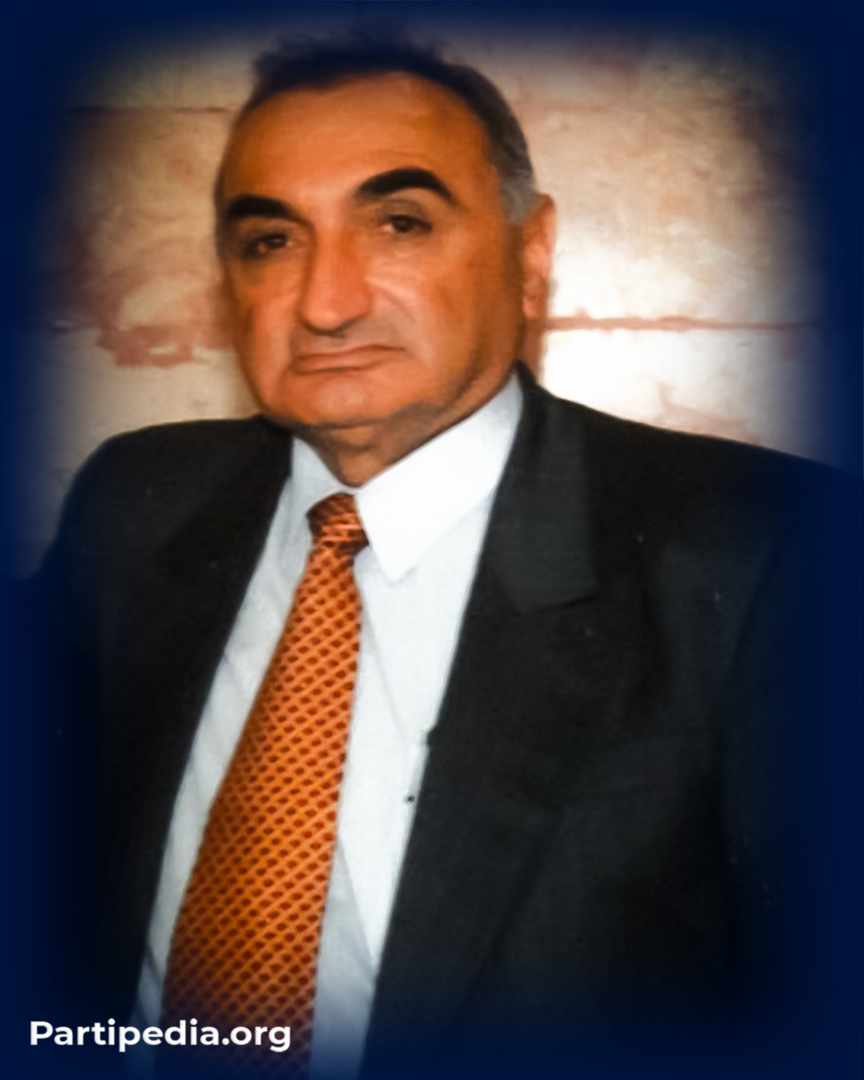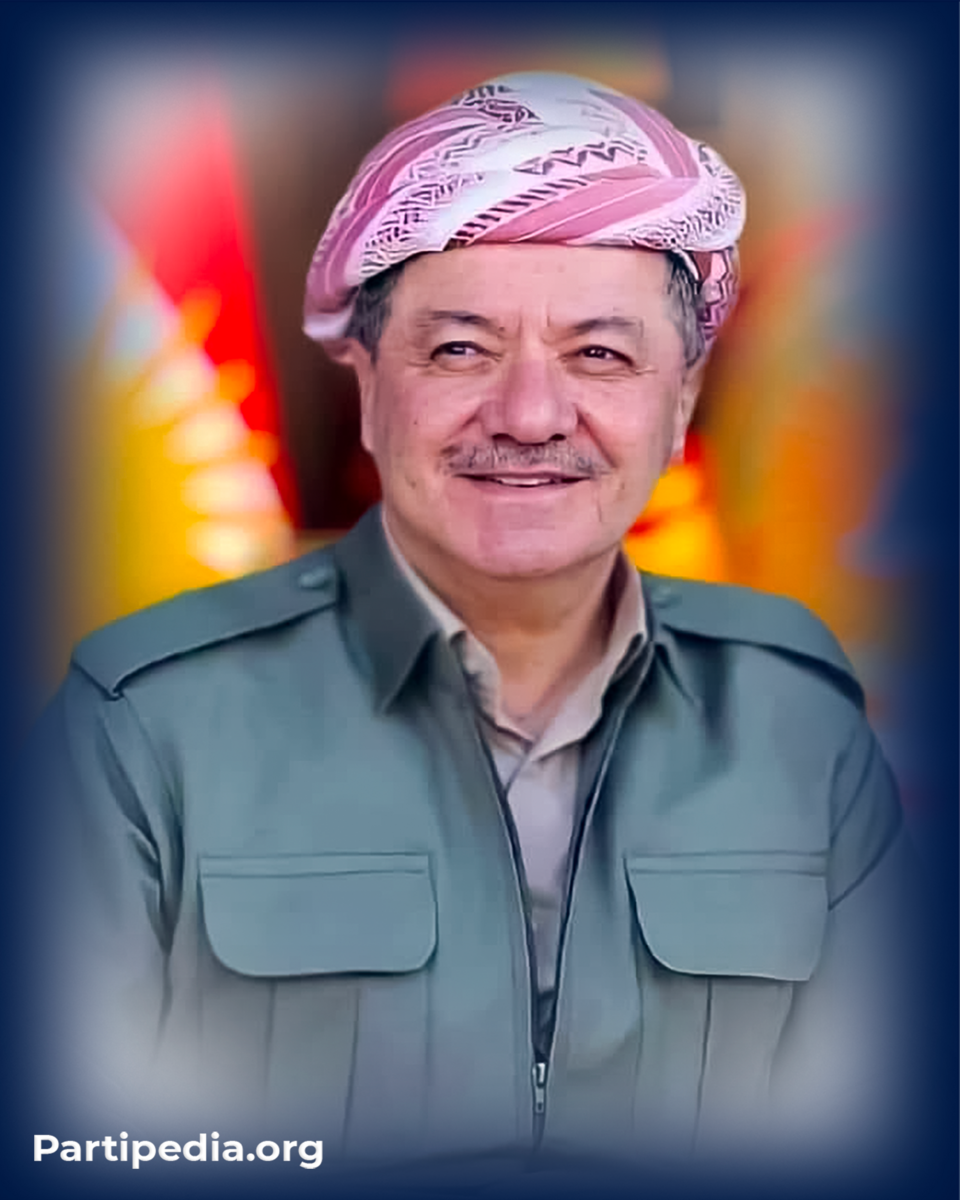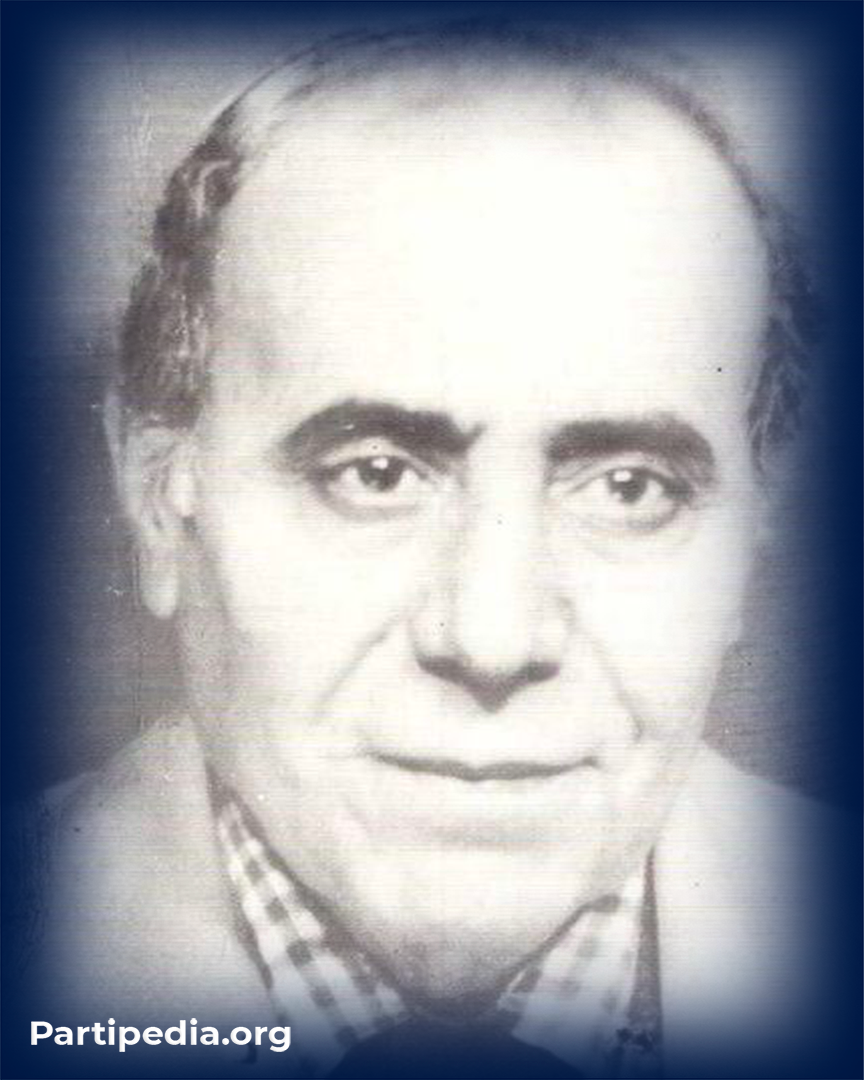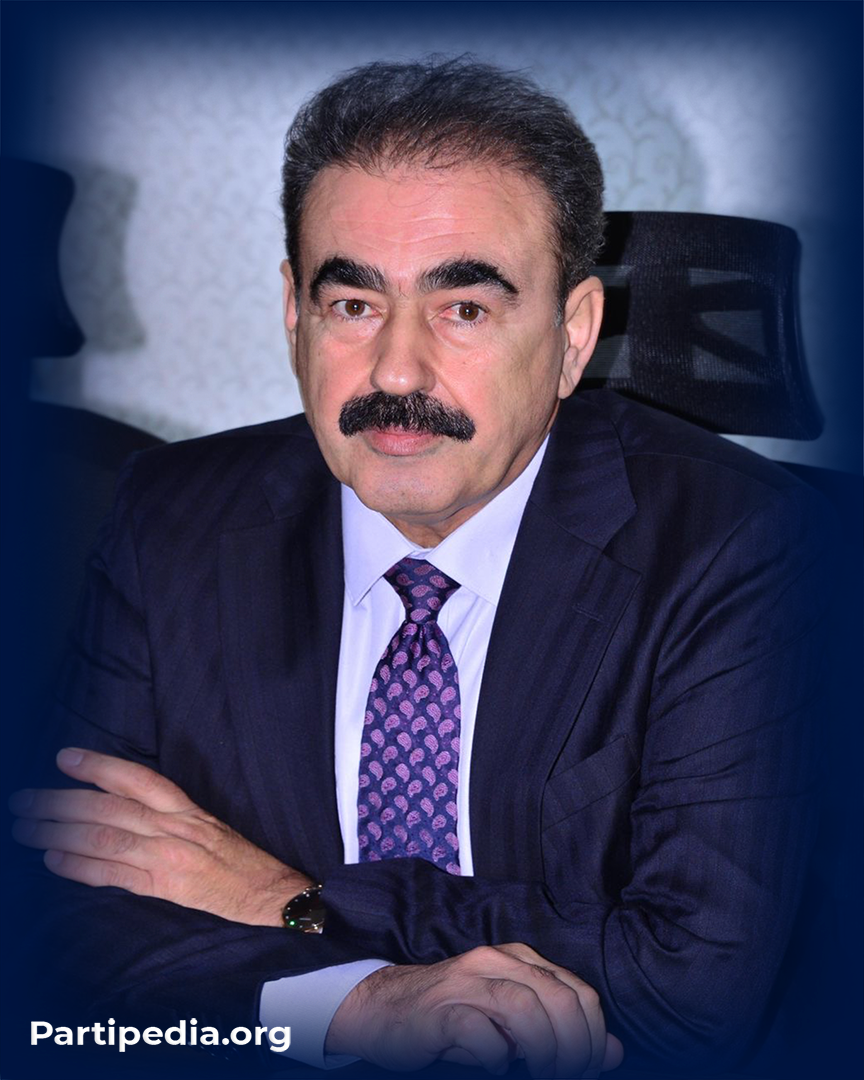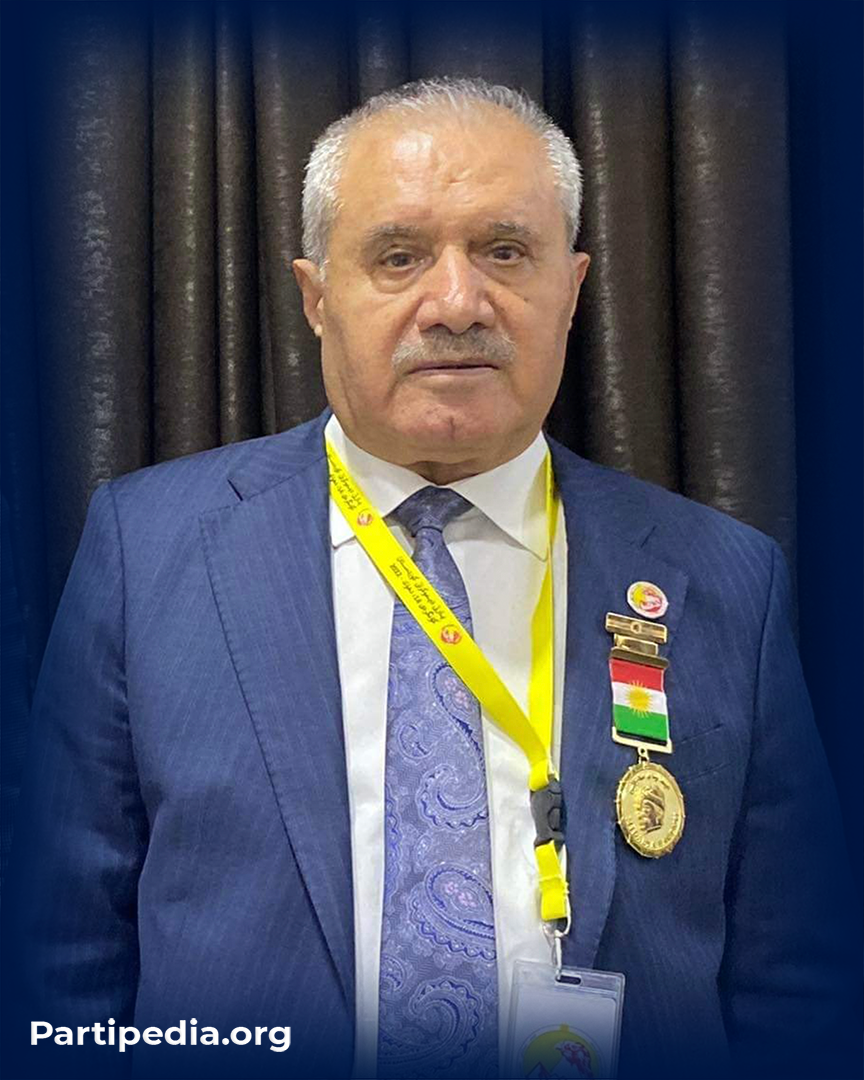Franso Toma Kanun, also known as Franso Hariri, a teacher, and politician, joined the Kurdistan Democratic Party (KDP) in 1963. In 1969, he became the head of the Balak Regional Committee of the Second Branch Committee. In 1979, he became a reserve member of the Central Committee of the Ninth Congress. In 1988, he was a member of the Political Bureau of the KDP and a member of the Executive Bureau of the Kurdistan Front. On June 4, 1992, he became a member of the Kurdistan National Assembly. He was elected as a member of the Central Committee in the 11th and 12th Congresses. In 1996, he was appointed as a minister of the Kurdistan Region. From October 1, 1996, to February 18, 2001, he was the governor of Erbil.
Biography
Franso Toma Kanun Hariri was born in 1937 in Harir village, Shaqlawa district, Erbil province, to an Assyrian Christian family. He was born an Eastern Orthodox Christian. He attended primary school in Harir and secondary school in Shaqlawa. He graduated from the teachers' college in Erbil in 1960. He was married and had four sons and one daughter. From 1960 to 196, he was appointed as a sports teacher in Ble and Barzan regions. He was a good athlete, and he loved sports. Between 1953 and 1955, he participated in school jumping competitions and represented Erbil province in Baghdad.
In 1953, he participated in the reception of Faisal I, the first Iraqi king, with the students of Erbil High School. In 1956, he was a member of the football team of Brusk Club in Erbil. On December 7, 1957, he participated as an actor in the play, Shahrzad in Erbil. The profits of the play were donated to the flood victims of Sulaimani. On October 7, 1958, he visited and welcomed back General Mustafa Barzani (1903-1979) who returned to Baghdad from the Soviet Union. In 1959, he played for the Erbil Bruski team. On June 5, 1959, he represented the Iraqi General Students Union of the Iraqi Communist Party in the elections of the Defense Committee of the Iraqi Republic in Erbil.
In 1975, after the collapse of the September Revolution, he fled to Iran and settled in Urmia province. He later moved to Karaj and settled there. In 1991, after the Kurdistan mass uprising, he returned to South Kurdistan and he played a significant role in the development of Erbil.
Fransois Thomas Hariri was assassinated on February 18, 2001, while walking to work on 60 Meter Street in Erbil, by a group of the Islamic Unity Movement. Two days after his martyrdom, on February 20, 2001, he was buried in his native semi-district, Harir in the presence of President Massoud Barzani and more than half a million people. He was fluent in Kurdish, Arabic, Syriac, and Persian.
Francos’s Striving Record
Fransos Thomas Hariri, his first political career, became a member of the Iraqi Communist Party, and the head of the party's Ruandz regional committee. In 1961, he was the head of the Erbil branch of the Iraqi General Union of the Iraqi Communist Party. However, he was impressed by the character of President Mustafa Barzani, which is why, in 1963, he joined the KDP and the Peshmerga forces of the September Revolution. In 1963, he was in charge of Peshmerga follow-up and social affairs in the Balakaity region of Erbil province. In 1964, he was appointed to be in charge of security in Galala village of Erbil province.
In 1965, he was the deputy commander of the Balak force of the second army. In 1966, he was in charge of supporting the Peshmerga forces in the Zozk battle in Erbil province. In 1966, under the supervision of Ali Qasim, also known as Ali Sinjar, he prepared the venue for the seventh Congress of the KDP in Galala. In 1967, he was among the founders of the Kurdistan Defense Agency. In 1967, he accompanied President Mustafa Barzani to the reception of Dr. Abdulrahman Bazaz (1914-1973), the Iraqi Prime Minister, near the town of Ruandz in Erbil province. He visited Kurdistan for the purpose of negotiations. In 1968, he was as a writer and announcer in the Assyrian language department of the Voice of Kurdistan Radio channel. In 1970, he was appointed as the head of the Balaki area committee of the second branch of the KDP. On July 15, 1970, he participated in the opening ceremony of the sixth congress of the Kurdistan Students Union in Nawprdan village in Erbil province. In 1970, he participated as a referee in the football competition between the Political Bureau team and students of Ghala in Nawprdan stadium. On July 1, 1970, he was appointed as the first governor of the Choman region in Erbil by order of the revolutionary leadership council. On July 15, 1970, as a guest, he participated in the sixth congress of the Kurdistan Students Union in Nawprdan village. In early 1971, he served as the governor of Choman and was appointed as a second-class criminal judge by the Minister of Justice. In 1974, he was appointed as a member of the seventh branch of the Kurdistan Democratic Party.
In March 1975, he visited and spoke for the refugees in Zewa camp in East Kurdistan to encourage them. In April 1975, he was appointed by Comrade Massoud Barzani to prepare for the May Revolution. In mid-1977, under the leadership of Idris Barzani (1944-1987), he participated in a large meeting in Karaj to assist the interim leadership of the KDP and to supervise the refugees from South Kurdistan in the Kingdom of Iran. His house was a meeting place and it was a place to hide the wounded.
In 1977, he moved to Karaj, Iran, and his house was used as a gathering place for those who joined the Peshmerga forces of the KDP or returned from the liberated areas of South Kurdistan to contact Idris Barzani. In 1979, he was elected as a reserve member of the Central Committee of the KDP by the delegates of the 9th Congress. In 1984, he was promoted to a member of the Central Committee of the KDP.
In 1984, he was a member of the KDP inspection committee in the third and fourth branches of the KDP region. From November 30, 1985, to April 4, 1986, he was a teacher of political parties in the eighth course of the KDP Cadres Institute in Razhan village, East Kurdistan. From late 1985 to late 1986, he was appointed as the head of the second branch committee of the KDP for the first time by the twentieth staff of the branch.
In 1986, he was the editor of Safin magazine, the organ of the second branch of the KDP. In 1988, he was a member of the political bureau of the KDP. In 1988, he was elected as a member of the Executive Bureau of the Kurdistan Front. In 1988, he participated in the battle of Khawkurk in Erbil province against the Iraqi army. On 13 December 1990, he was appointed as the head of the KDP relations in the Kurdistan Front. On March 8-10, 1990, he participated in a broad meeting of the Kurdistan Front.
In 1991, he accompanied President Massoud Barzani in the uprising in South Kurdistan. In 1991, he participated in the liberation of Kirkuk. In 1991, he was in charge of the central bureau of the KDP. From December 16, 1991, to February 18, 1992, he was a teacher of the political situation in Kurdistan and Iraq in the ninth course of the KDP Cadre Institute in Pirmami village of Erbil province.
On March 19, he participated in the Kurdistan Front meeting to determine the date of the Kurdistan National Assembly elections and discuss the economic and security situation in South Kurdistan. In early 1992, he participated in the Kurdistan Front meeting on behalf of the Kurdistan Democratic Party to form the High Supervisory Committee for the Kurdistan National Assembly elections. On 23-28 December 1992, he was appointed by the Kurdistan Front as a member of the 15-member committee to write the Kurdistan National Assembly bill.
On June 4, 1992, he became a member of the Kurdistan National Assembly on the list of the KDP. In 1992, he became the leader of the Yellow Faction (KDP) in the Kurdistan National Assembly. In 1993, he was elected as the honorary president of Erbil Sports Club by the board of directors. In 1993, he received an official license from the Ministry of Culture of the Kurdistan Regional Government as the owner of Gulan newspaper. In July 1993, he was appointed as the chairman of the welcoming committee of the eleventh Congress of the Kurdistan Democratic Party-United (KDP).
In 1993, he was a member of the Preparatory Committee of the 11th Congress in Erbil. In 1993, he was elected as a member of the Central Committee of the Kurdistan Democratic Party-United (KDP) by the delegates of the 11th Congress. In 1994, he was a teacher of general subjects at advanced short courses at the KDP Cadres Institute in Pirmam. In 1994, he was appointed as the head of the second branch of the Kurdistan Democratic Party-United (KDP).
On 19 July 1994, he was shot by the Patriotic Union of Kurdistan (PUK) forces in Shawes, Erbil province, fortunately, he survived the attack. On August 16, 1996, he was awarded the Immortal Barzani Medal by President Massoud Barzani for his services in the September Revolution, May Revolution, and the South Kurdistan Uprising.
In 1996, he was appointed as the Minister of the Kurdistan Region in the third cabinet of the Kurdistan Regional Government. From October 1, 1996, to February 18, 2001, he was the Governor of Erbil. During his tenure as the governor of Erbil, he did many important things, especially the construction of the Erbil International Stadium (Martyr Franso Hariri) and the Palace of Arts, as well as the establishment of the Kurdistan Orchestra. He also carried out many other civil works and projects, he played a significant role in the development of the sports sector in the Kurdistan Region and supported and encouraged athletes and youth to achieve their rights. He participated in many projects and activities to beautify and modernize Erbil, and he was considered a strong supporter of education, health, and sports projects in Erbil. Hariri has been an honest, loyal and caring person in the administration. He was also loyal to his friends and was friends with most classes.
On December 18, 1996, he was a minister in the third cabinet of the Kurdistan Region. On Sunday, February 23, 1997, he survived a terrorist attack. On July 26, 1997, he participated in the first congress of the Kurdish Failis Association in Erbil under the supervision of President Massoud Barzani. In 1998, he was the owner of Erbil magazine. In 1999, he was elected as a member of the central committee of the KDP by the delegates of the 12th Congress.
On Monday, December 24, 2000, he was appointed as the head of the second Branch Committee in Erbil for the second time by the 28th staff of the branch. On March 14, 2000, he was appointed by the Kurdistan National Assembly as a member of the committee to revive the birth anniversary of the Kurdish leader Barzani.
His Works:
1. Why is the PKK doing this? (First edition – 2000), (Second edition - 2018).
2. In order not to write history incorrectly – 1995. In 1996, the Arabic edition was published under the title (For those who do not write history incorrectly).
Sources:
-
ئهرشیفی دهستهی ئینسكلۆپیدیای پارتی دیموكراتی كوردستان.
-
ئامادهكردنی ئهنوهر عهبدوڵا، ٢٩ی ئهیلوولی ١٩٧١ بارزانیی نهمر له پیلانی دوژمنان گهورهتربوو، ڕۆژنامهی برایهتی، ئۆرگانی پارتی دیموكراتی كوردستان ـ یهكگرتوو، ژماره ٢٩٣٤، ههولێر، چوارشهمه، ٢٩ ئهیلوولی ١٩٩٩ز، ل ٢.
-
حول محاولة اغتیال السید فرنسو حریري، جریدة خهبات، لسان حال الحزب الدیمقراطي الكوردستاني، العدد ٨١٦، أربیل، الجمعة، ٢٨ شباط ١٩٩٧م، ص ٢.
-
كۆنگره، دهرئهنجامهكانی ههڵبژاردنی کۆمیتەی ناوەندیی پارتیمان ڕادهگهینێت، ڕۆژنامهی برایهتی، ئۆرگانی پارتی دیموكراتی كوردستان ـ یهكگرتوو، ژماره ١٧٢٩، ههولێر، ههینی، ٢٧ ئابی ١٩٩٣ز، ل ١.
-
شێرزاد، چالاكی لێژنهكانی كۆنگرهی پارتیمان، ڕۆژنامهی برایهتی، ئۆرگانی پارتی دیموكراتی كوردستان، ژماره ١٦٩١، ههولێر، دووشهمه، ١٢ تهموزی ١٩٩٣ز، ل ٤.
-
حامید گهوههری، میدالیای بارزانی بهرزترین خهڵاتی ڕیزلێنان، كتێبی دووهم، چاپی دووهم، (ههولێر ـ دهزگای خێرخوازی بارزانی ـ ٢٠١٩ز)، ل ل ٣٢ ـ ٣٧.
-
هۆشیار نوری لهك، ناودارانی كورد له دێڕێكدا، (ههولێر ـ چاپخانهی چوارچرا ـ ٢٠١٠ز)، ل ٢٤.
-
كنێر عهبدوڵڵا، بهشداری سیاسی ژنان له باشوری كوردستان، (سلێمانی ـ ٢٠١٦م)، ل ل ٧٤، ٨١.
-
فهرهنسۆ ههریری، چما پهكهكه وا دهكات؟، چاپی دووهم، (ههولێر ـ چاپخانهی ڕۆكسانا ـ ٢٠١٨ز)، ل ل ١، ١٠٥.
-
علي سنجاري، القضیة الكوردیة وحزب البعث العربي الأشتراكي في العراق، الجزء الثالث، (دهوك ـ مطبعة خاني ـ ٢٠١٢م)، ص ص ٣٦٢، ٣٧١.
-
في سبیل السلم والوحدة الوطنیة في سبیل تطبیق اتفاقیة آذار، القسم العاشر، جریدة الـتآخي، دار التآخي للطباعة و النشر، العدد ١١٩٠، بغداد، مطبعة التایمس، الأحد، ١٩ تشرین الثاني ١٩٧٢م، ص ٨.
-
سهفهر ژاژۆكی، یادێك بۆ شههیدی سهركرده فرهنسۆ ههریری، ڕۆژنامهی خهبات ژماره(4506)، 18/2/2014.




